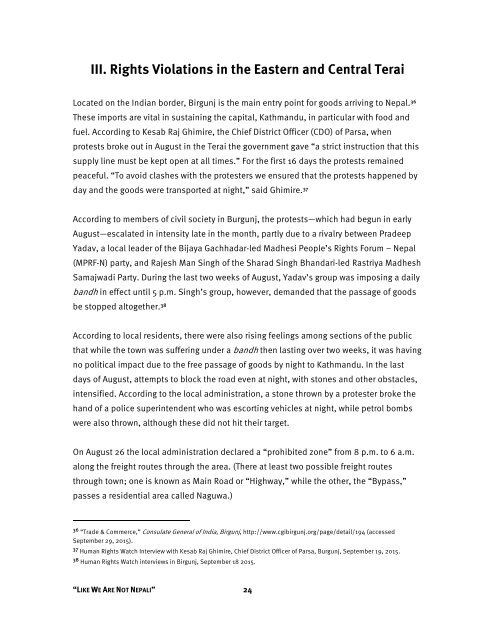“Like We Are Not Nepali”
nepal1015_forupload
nepal1015_forupload
Create successful ePaper yourself
Turn your PDF publications into a flip-book with our unique Google optimized e-Paper software.
III. Rights Violations in the Eastern and Central Terai<br />
Located on the Indian border, Birgunj is the main entry point for goods arriving to Nepal. 36<br />
These imports are vital in sustaining the capital, Kathmandu, in particular with food and<br />
fuel. According to Kesab Raj Ghimire, the Chief District Officer (CDO) of Parsa, when<br />
protests broke out in August in the Terai the government gave “a strict instruction that this<br />
supply line must be kept open at all times.” For the first 16 days the protests remained<br />
peaceful. “To avoid clashes with the protesters we ensured that the protests happened by<br />
day and the goods were transported at night,” said Ghimire. 37<br />
According to members of civil society in Burgunj, the protests—which had begun in early<br />
August—escalated in intensity late in the month, partly due to a rivalry between Pradeep<br />
Yadav, a local leader of the Bijaya Gachhadar-led Madhesi People’s Rights Forum – Nepal<br />
(MPRF-N) party, and Rajesh Man Singh of the Sharad Singh Bhandari-led Rastriya Madhesh<br />
Samajwadi Party. During the last two weeks of August, Yadav’s group was imposing a daily<br />
bandh in effect until 5 p.m. Singh’s group, however, demanded that the passage of goods<br />
be stopped altogether. 38<br />
According to local residents, there were also rising feelings among sections of the public<br />
that while the town was suffering under a bandh then lasting over two weeks, it was having<br />
no political impact due to the free passage of goods by night to Kathmandu. In the last<br />
days of August, attempts to block the road even at night, with stones and other obstacles,<br />
intensified. According to the local administration, a stone thrown by a protester broke the<br />
hand of a police superintendent who was escorting vehicles at night, while petrol bombs<br />
were also thrown, although these did not hit their target.<br />
On August 26 the local administration declared a “prohibited zone” from 8 p.m. to 6 a.m.<br />
along the freight routes through the area. (There at least two possible freight routes<br />
through town; one is known as Main Road or “Highway,” while the other, the “Bypass,”<br />
passes a residential area called Naguwa.)<br />
36 “Trade & Commerce,” Consulate General of India, Birgunj, http://www.cgibirgunj.org/page/detail/194 (accessed<br />
September 29, 2015).<br />
37 Human Rights Watch Interview with Kesab Raj Ghimire, Chief District Officer of Parsa, Burgunj, September 19, 2015.<br />
38 Human Rights Watch interviews in Birgunj, September 18 2015.<br />
“LIKE WE ARE NOT NEPALI” 24


